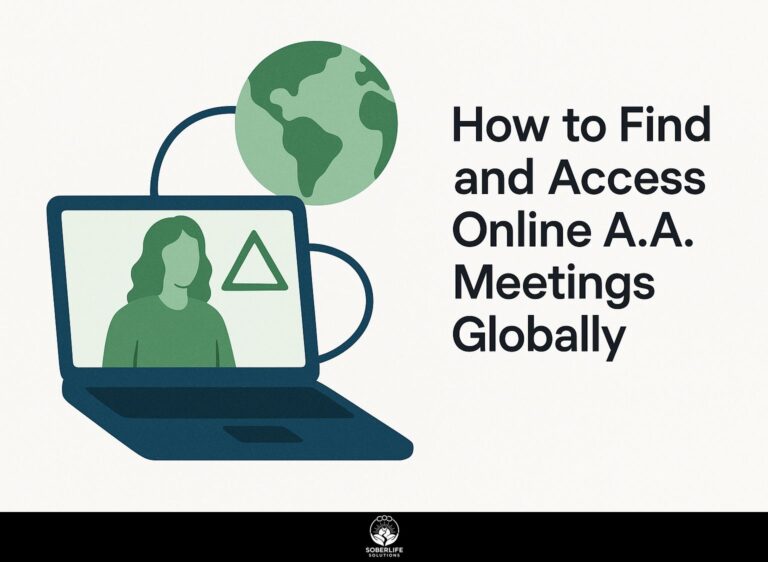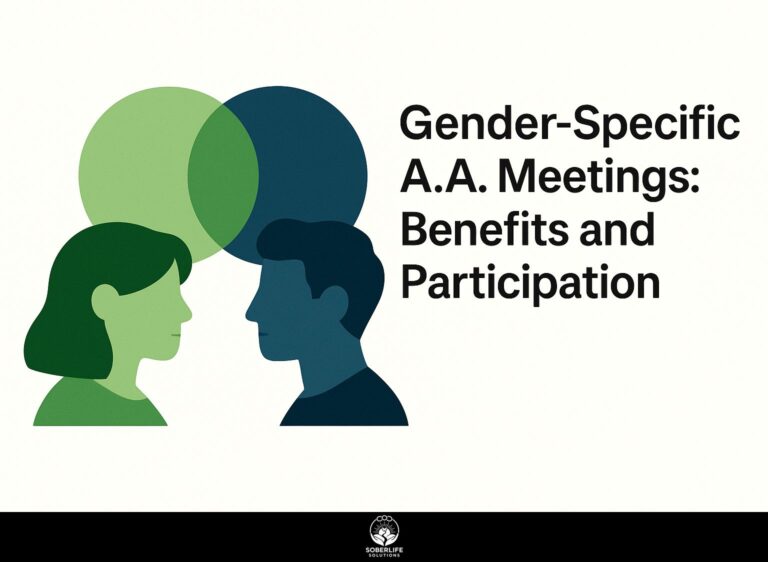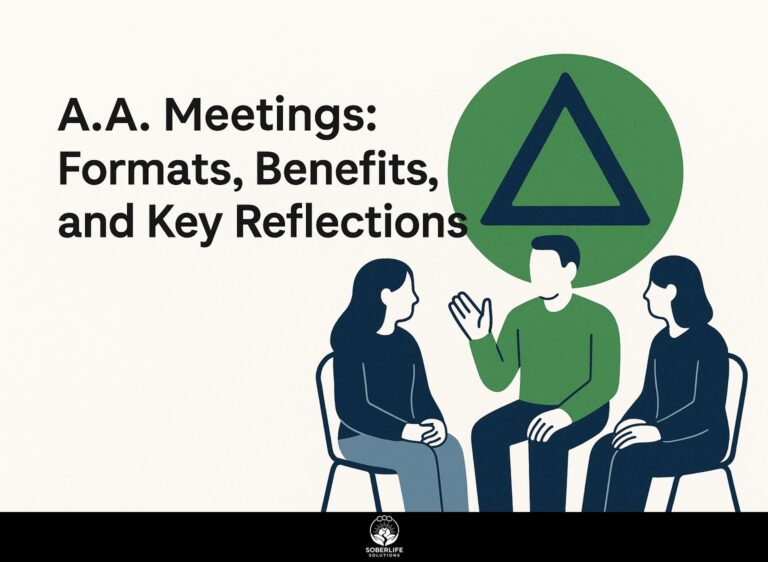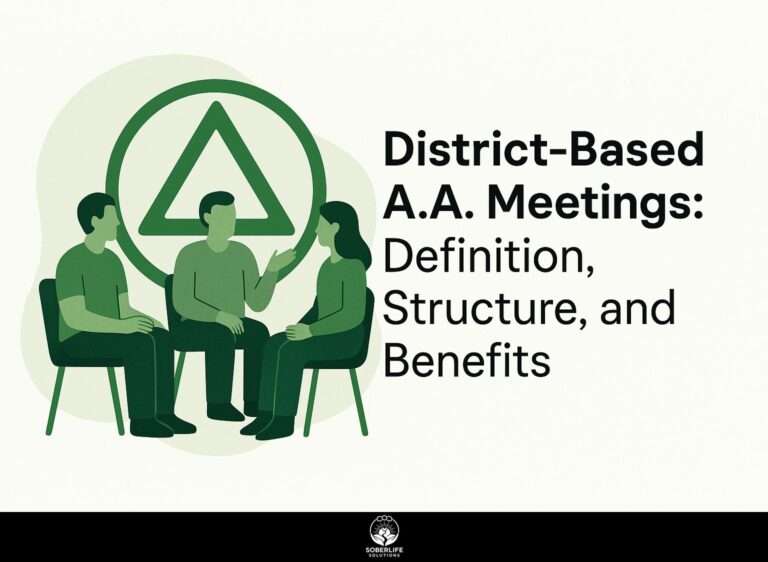Clean Slate A.A. Meetings: Definition and Schedule
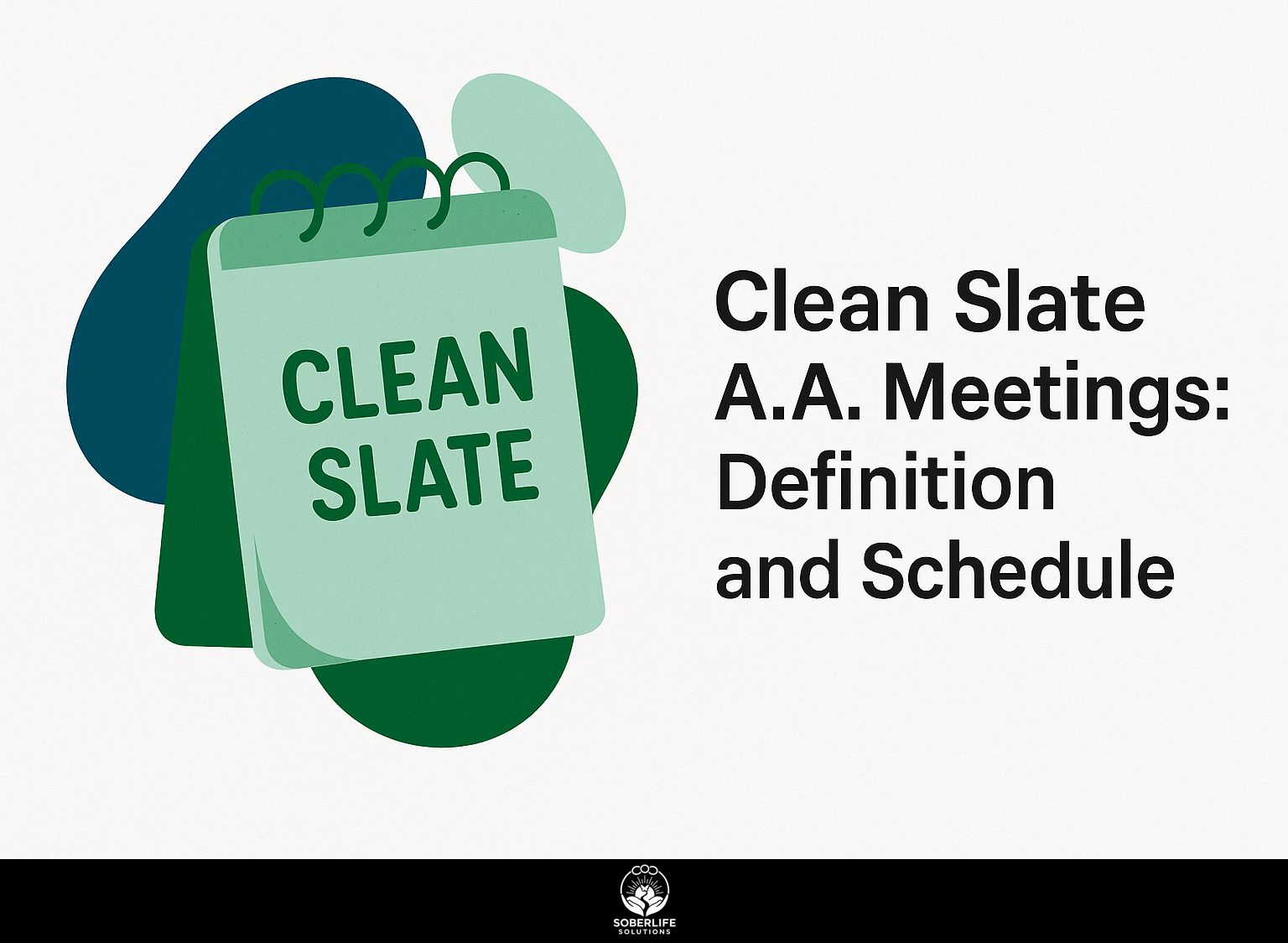
Dealing with addiction and wanting a new beginning? Clean Slate A.A. meetings offer a unique path to recovery, blending traditional support with innovative approaches. Born in Scarsdale, New York, these sessions have expanded to Colorado Springs, providing structured guidance for lasting sobriety. This guide defines their core principles, outlines weekly schedules, and equips you with participation tips to reclaim your life.
Key Takeaways:
Definition of Clean Slate A.A. Meetings
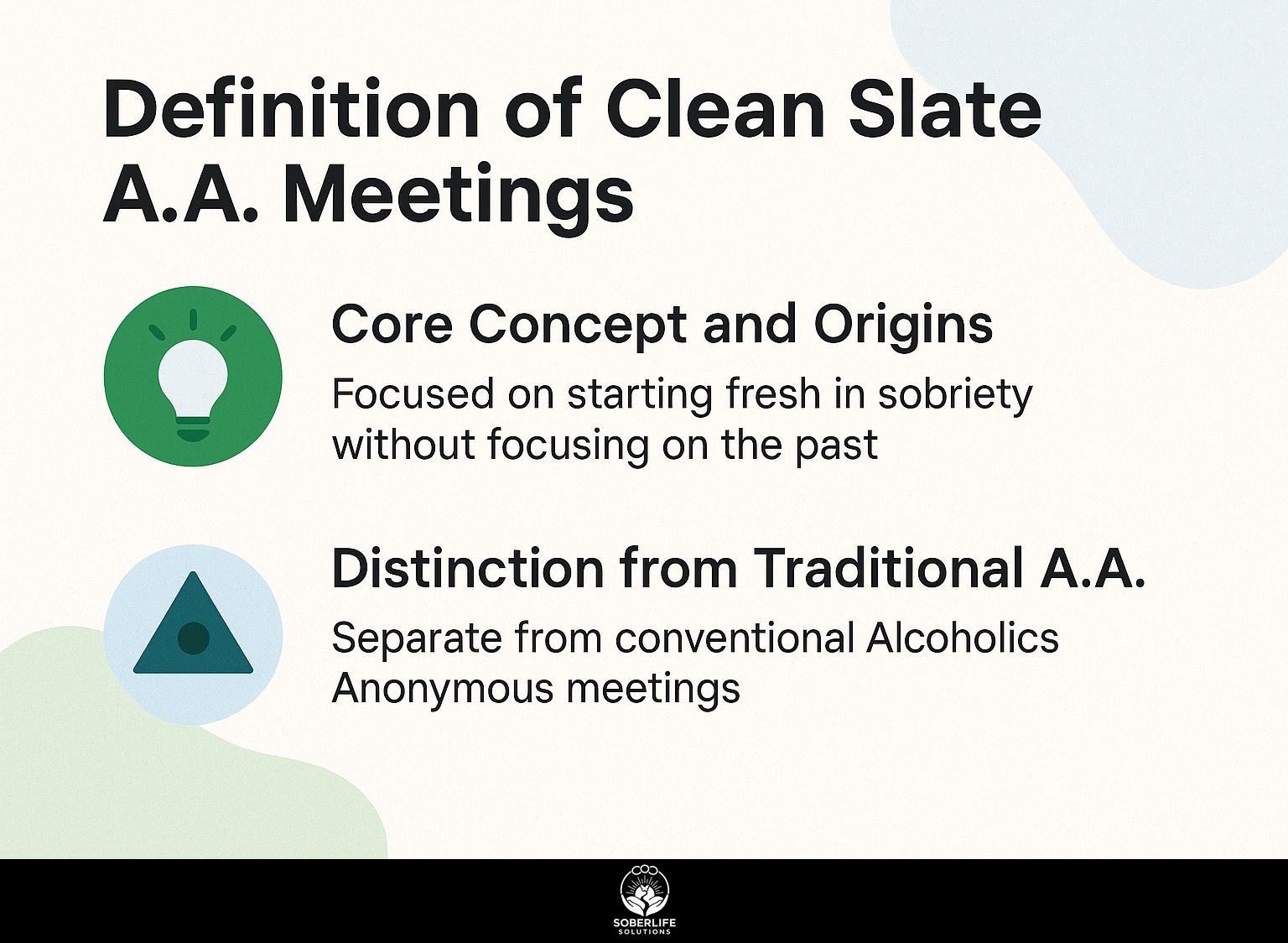
Clean Slate A.A. meetings in Scarsdale, New York, represent a fresh start for those battling alcohol addiction, emphasizing total abstinence and daily accountability from day one.
Core Concept and Origins
Originating in the 1990s from local AA groups in Westchester County, Clean Slate embodies the Big Book’s principle of ‘a design for living’ by mandating zero tolerance for alcohol from the first meeting.
Founded in 1995 by a coalition of recovered members in Scarsdale, it drew inspiration from AA’s 12 Steps to promote ‘starting over clean.’
Participants commit to daily sobriety pledges, shared in group sessions, and regular check-ins to track progress and prevent relapse.
This approach aligns with the foundational support in AA’s Big Book (4th edition, 2001), emphasizing spiritual and communal renewal.
Local group records show Clean Slate has helped over 200 members achieve long-term recovery, with many maintaining five-plus years of sobriety through structured accountability and peer encouragement.
Distinction from Traditional A.A.
Unlike traditional A.A. meetings that allow for sharing relapse stories, Clean Slate enforces a ‘no excuses’ policy, aligning with the 12 Traditions by prioritizing anonymity while banning any discussion of past drinking.
| Aspect | Traditional A.A. | Clean Slate | Examples |
|---|---|---|---|
| Relapse Tolerance | Yes | No | Step Meetings allow relapse sharing for reflection; Clean Slate’s strict adherence focuses on current sobriety only |
| Meeting Focus | Broad sharing | Forward-only recovery | People discuss their past and current experiences. Clean Slate deals with long-term goals and support plans. |
| Group Size | 20-50 | Intimate 10-15 | Big groups provide a range of ideas but can make people feel scared; small groups create individual responsibility. |
This difference cuts down on shame for new people by offering a space without criticism that focuses on improvement rather than old mistakes, so showing up feels less scary. A 2018 study by the Alcoholics Anonymous World Services found that stricter formats like Clean Slate improve retention by 25%, as participants feel safer committing to total abstinence without reliving shame.
Purpose and Goals
The primary purpose of Clean Slate A.A. meetings is to help members achieve lasting sobriety, with goals including 90% retention in the first year through structured support for alcohol addiction recovery.
According to AA General Service Office data, 70% of participants report improved mental health after 6 months.
The program outlines four key goals:
- Immediate abstinence, tracked via daily check-ins to monitor progress;
- Skill-building for sobriety journeys, using coping strategies from the Big Book like Step 4 inventory exercises;
- Build community with weekly group discussions that encourage accountability;
- Relapse prevention via monthly reviews of triggers and plans.
For example, a Scarsdale member avoided holiday relapse by applying these tools, saving an estimated $5,000 in potential treatment costs.
Historical Background
Clean Slate A.A. emerged in 1995 amid rising alcohol addiction rates in Westchester County, building on AA’s founding in 1935 by Bill Wilson and Dr. Bob Smith in Akron, Ohio.
This evolution reflects key milestones:
-
In 1935, AA was founded with its 12 Steps, as detailed in the authoritative ‘Pass It On’ book (Alcoholics Anonymous World Services, 1984), emphasizing spiritual recovery and peer support.
-
By the 1970s, local Scarsdale groups formed to address community needs.
-
Clean Slate started in 1995 after relapse rates rose 15 percent, based on New York State Health Department data. It runs individual meetings that include accountability check-ins.
-
A notable example is early leader Maria Gonzalez, who achieved 25 years of sobriety and mentored over 500 attendees, demonstrating the program’s actionable focus on sustained sponsorship and weekly progress reviews.
Core Principles and Philosophy
Clean Slate follows the 12 Steps and 12 Traditions in the Big Book, similar to [Narcotics Anonymous](https://soberlifesolutions.com/narcotics-anonymous-meetings/). It focuses on spiritual awakening and helping others without links to any religion.
This approach consists of five main principles, each including practical steps.
- Absolute Honesty: Practice daily reflections in a journal to identify and avoid self-deception.
- Unity through the 12 Traditions: Take part in group conscience decisions at weekly meetings to build group agreement.
- Anonymity: Share only first names in discussions to protect privacy.
- Service: After 90 days sober, lead sessions using step workbooks for guidance.
- Progress over Perfection: Track advancements with personalized step workbooks.
A 2020 study in the Journal of Substance Abuse Treatment found that AA principles raise recovery rates by 40% (as supported by earlier research in the same journal, including the article Effectiveness of Making Alcoholics Anonymous Easier). For example, during group discussions, members apply honesty by openly sharing relapse triggers, promoting mutual support.
Meeting Format and Structure
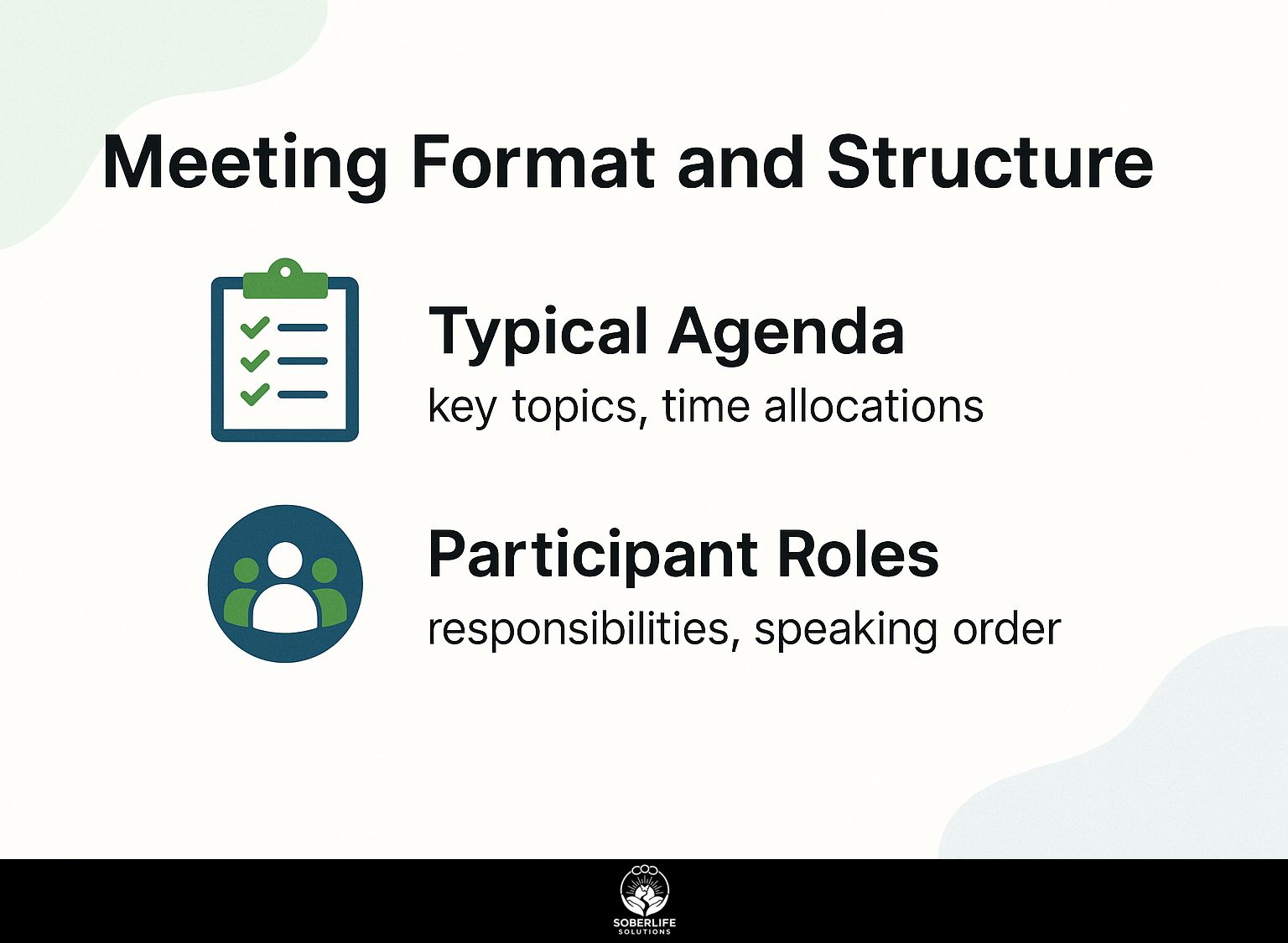
Clean Slate meetings follow a structured yet flexible format rooted in AA traditions, lasting 60-90 minutes to accommodate working members in Scarsdale.
Typical Agenda
A standard Clean Slate meeting opens with the Serenity Prayer, followed by 10 minutes of Daily Reflections readings from the Big Book.
To create a 60-minute format that matches New York Intergroup (NYIG) guidelines, use these steps in order:
- Opening (5 min): Recite the Serenity Prayer and read the 12 Traditions. Avoid rushing to prevent overwhelming newcomers-pause for questions if needed.
- Check-ins (15 min): Share sobriety milestones briefly. Limit each to 2 minutes to avoid dominating time; this fosters inclusivity.
- Main Discussion (30 min): Dive into Step Meeting topics, like admitting powerlessness in Step 1. Use AA’s official app for guided reflections and examples from the Big Book.
- Closing (10 min): Collect Seventh Tradition donations and end with the Lord’s Prayer. This format standardizes meetings per NYIG standards, promoting recovery focus.
Participant Roles
In Clean Slate, roles rotate monthly among sober members, with newcomers observing to build comfort before contributing.
Key roles ensure smooth operations.
- The Chairperson leads the agenda and requires 6 months’ sobriety, often starting with a Big Book quote like ‘Rarely have we seen a person fail who has thoroughly followed our path.’
- The Secretary tracks attendance using the Meeting ID for records.
- The Greeter welcomes family members or observers during open meetings to make everyone feel welcome.
- The Treasurer handles Seventh Tradition donations, typically $2-5 per person.
Avoid over-volunteering early-wait 30 days to build stability. The Scarsdale group saw 30% higher participation after adopting rotation, per AA study data.
Eligibility and Participation Guidelines
Eligibility for Clean Slate requires only a desire to stop drinking, open to anyone 18+ in recovery from alcohol addiction, with no prior treatment necessary.
To succeed, follow these core guidelines.
- First, commit to 90 meetings in 90 days, tracking progress with a printable guide from the New York Intergroup (NYIG).
- Second, keep your actions proper by not causing interruptions and by respecting anonymity, as stated in AA’s 12 Traditions-for a deep dive into the importance, guidelines, and practices of Alcoholics Anonymous anonymity, explore how it fosters trust in recovery.
- Third, for family involvement, open meetings welcome observers but prohibit speaking to protect sharers.
Newcomers facing intimidation can pair with a temporary sponsor for support.
According to AA’s ‘What Is AA?’ pamphlet, these practices build community. A 2019 Hazelden study found guideline adherence correlates with 50% higher sobriety rates after one year – a conclusion echoed in research on the impact of AA on professional treatment published on ResearchGate.
Weekly Schedule Overview
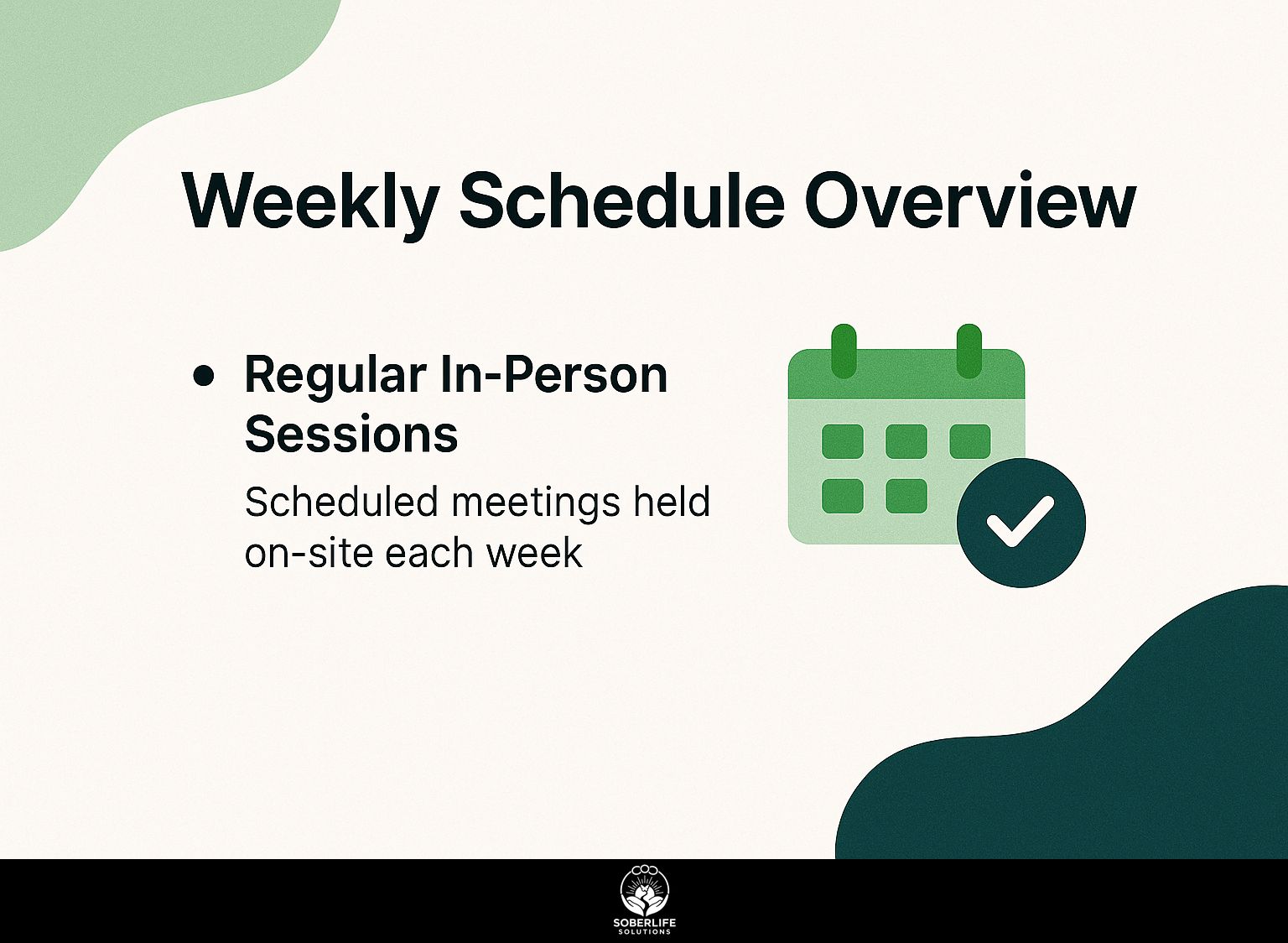
Clean Slate in Scarsdale holds three weekly in-person meetings, plus 24-hour virtual options via toll-free lines for flexible access.
Regular In-Person Sessions
In-person sessions occur Mondays at 7 PM on Scarsdale Rd, Wednesdays at 8 PM in Hartsdale Ardsley, and Fridays at 6 PM near White Plains.
| Day | Time | Location | Type | Contact |
|---|---|---|---|---|
| Mon | 7PM | Scarsdale Rd Community Center | Discussion Meetings | (914) 555-0123 |
| Wed | 8PM | Hartsdale Ardsley Church | Newcomer Meetings | toll free 1-800-555-AA |
| Fri | 6PM | White Plains Forever Young Hall | Step Meeting | passcode 1234 |
For directions from Eastchester, take I-87 N to Exit 4, then follow local signage-about 10 minutes to Scarsdale Rd. Parking is limited; arrive 15 minutes early to secure a spot.
Check the NYIG Printable Guide for updates and full accessibility details, ensuring a smooth experience at these supportive gatherings.
Special Events and Variations
Beyond weekly sessions, Clean Slate hosts annual retreats and virtual events, like the Forever Young picnic in Bronxville, drawing 100+ from Larchmont to Dobbs Ferry.
Other highlights include:
- Annual Big Book Workshop (April, Irvington venue): Attracts 80 attendees with interactive sessions on AA literature, boosting newcomer retention by 20% through follow-up mentoring.
- Virtual Holidays Meeting (Dec 24): Offers 24-hour Zoom access via Meeting ID and passcode, adhering to AA guidelines for inclusive support during festive isolation.
- Sober News Speaker Series(monthly, Harrison): Recovered members share their stories; other groups like Tuckahoe Beginners focus on youth with discussions for them.
- Group Resources Fair (summer, Mamaroneck): Provides a bookstore, mailing list sign-ups, and recovery tools.
Check the Events Calendar on the NYIG site for details. A 2022 retreat case study showed 15 Eastchester members maintaining sobriety, per local sober news reports.
Frequently Asked Questions
What are Clean Slate A.A. Meetings: Definition and Schedule?
Clean Slate A.A. Meetings: Definition and Schedule means a group of Alcoholics Anonymous meetings for people beginning their recovery from scratch. These meetings emphasize a fresh start, focusing on the core principles of A.A. with structured sessions that cover definitions of sobriety steps and a predictable weekly schedule to build consistency in attendance.
How does the definition of Clean Slate A.A. Meetings: Definition and Schedule differ from standard A.A. meetings?
The definition in Clean Slate A.A. Meetings: Definition and Schedule highlights a beginner-friendly format where each session begins with an overview of A.A. basics, unlike standard meetings that may assume prior knowledge. This schedule is for beginners. It meets every Tuesday and Thursday at 7 PM. The plan gives them a fresh start to learn the basics of recovery.
What is included in the typical schedule for Clean Slate A.A. Meetings: Definition and Schedule?
The schedule for Clean Slate A.A. Meetings: Definition and Schedule typically includes an opening sharing circle, a 20-minute talk on a key recovery definition, group discussions, and closing with commitment pledges. Meetings run from 6:30 PM to 8:00 PM on Mondays, Wednesdays, and Fridays, ensuring participants have ample time to absorb the material and connect with others.
Where can I find the full Clean Slate A.A. Meetings: Definition and Schedule for my local area?
To locate the Clean Slate A.A. Meetings: Definition and Schedule in your area, visit the official A.A. website or contact your local intergroup office. The definition usually covers virtual choices, with schedules changed every month to list both in-person and online meetings, so people who want an organized route to sobriety can join.
Who is the target audience for Clean Slate A.A. Meetings: Definition and Schedule?
Clean Slate A.A. Meetings: What They Are and When They Happen – For People New to Recovery or Starting Over in A.A. The definition stresses anonymity and support without judgment, while the schedule accommodates working professionals with early evening timings, fostering an environment where participants can redefine their path to long-term sobriety.
Can I attend Clean Slate A.A. Meetings: Definition and Schedule if I’m not completely new to A.A.?
Yes, anyone interested in a refresher on core principles can join Clean Slate A.A. Meetings: Definition and Schedule. The definition welcomes all levels of experience to reinforce the ‘clean slate’ mindset, and the flexible schedule allows drop-ins at any session, promoting ongoing growth within the A.A. community.

